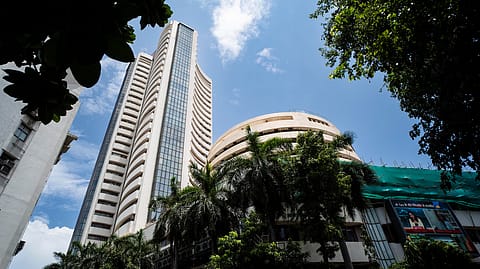Market closing: Sensex falls 375 points, Nifty ends at 25,150 amid trade deal uncertainty; IT stocks lead fall
Nifty IT was the worst performer with a 1.39% loss, led by heavyweights such as Tech Mahindra, Infosys, HCL Tech, TCS, LTIMindtree, Persistent Systems, Wipro, Mphasis, Coforge, and others.

Indian benchmark indices closed lower on the weekly expiry day as investor sentiment remained subdued amid a tepid start to the June quarter earnings season and uncertainty around the proposed India-U.S. trade deal. The BSE Sensex declined by 375.24 points, or 0.45%, to close at 82,259.24, while the NSE Nifty50 slipped 100.6 points, or 0.4%, ending the session at 25,111.45.
The broader market also ended in negative terrain, with the Nifty MidCap 100 index falling by 0.27%, while the Nifty SmallCap 100 declined 0.18%.
On the sectoral front, IT and banking emerged as the top laggards, while realty, metal, and pharma ended higher with modest gain. Nifty IT was the worst-performing index, losing 1.39%, with heavyweights like LTIMindtree, Tech Mahindra, Persistent Systems, Infosys, Wipro, Mphasis, Coforge, and HCL Tech each falling up to 1%.
"Indian equity benchmarks ended marginally lower as investors exercised caution amid subdued Q1 earnings announcements, particularly in the technology and banking sectors,” said Vinod Nair, Head of Research, Geojit Investments Limited.
He said that market participants remained sidelined due to elevated valuations of large-cap stocks and FII outflows owing to the uncertainty regarding US-India trade deal; however, any positive developments could amplify market sentiment.
Out of the 30 Sensex constituents, 23 stocks closed in the red. The top laggards were Tech Mahindra, Infosys, HCL Tech, Eternal, L&T, and TCS, falling up to 2.7%. On the other hand, Tata Steel, Trent, Titan, Tata Motors, Ultratech Cement, Bajaj Finance, and Sun Pharma ended in positive terrain, rising up to 1.6%.
“Global uncertainty and a muted start to the earnings season are weighing on investor sentiment. However, sustained liquidity inflows are helping to cushion the downside. This is clearly evident in the current market environment, where a divergent trend is visible—while the benchmark index is under pressure, mainly due to weakness in heavyweight IT stocks,” said Ajit Mishra – SVP, Research, Religare Broking.
Recommended Stories
“The resilience in the broader market further adds to this positive undertone. We recommend aligning positions accordingly, with a focus on stock selection and risk management, as the current market tone is likely to persist," he added.
Technically, after a muted open, the market has been consistently facing selling pressure at higher levels. The Nifty/Sensex has formed a bearish candle on daily charts and a lower top formation on intraday charts, which is largely negative, said Shrikant Chouhan, Head Equity Research, Kotak Securities.
He opines that as long as the Nifty and Sensex are trading below 25,200 and 82,500, respectively, the weak sentiment is likely to continue. “On the downside, the 50-day SMA (Simple Moving Average) at 25,000/82,000 would be the immediate support level. Below 25,000/82,000, the chances of hitting 24,900-24,850/81,600-81,500 would increase.”
“On the upside, a break above 25,200/82,500 could lead the market to retest the levels of 25,280/82,800. A successful breakout above 25,280/82,800 could push the market up to 25,350-25,425/83,000-83,300,” he said.
(INR CR)
Given the global uncertainty and a muted start to the earnings season, market analysts recommended focusing on stock selection and risk management, as the current market tone is likely to persist.
(DISCLAIMER: The views and opinions expressed by investment experts on fortuneindia.com are either their own or of their organisations, but not necessarily that of fortuneindia.com and its editorial team. Readers are advised to consult certified experts before taking investment decisions.)







